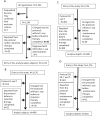Protracted Administration of L-Asparaginase in Maintenance Phase Is the Risk Factor for Hyperglycemia in Older Patients with Pediatric Acute Lymphoblastic Leukemia
- PMID: 26317422
- PMCID: PMC4552641
- DOI: 10.1371/journal.pone.0136428
Protracted Administration of L-Asparaginase in Maintenance Phase Is the Risk Factor for Hyperglycemia in Older Patients with Pediatric Acute Lymphoblastic Leukemia
Abstract
Although L-asparaginase related hyperglycemia is well known adverse event, it is not studied whether the profile of this adverse event is affected by intensification of L-asparaginase administration. Here, we analyzed the profile of L-asparaginase related hyperglycemia in a 1,176 patients with pediatric acute lymphoblastic leukemia treated according to the Japan Association of Childhood Leukemia Study ALL-02 protocol using protracted L-asparaginase administration in maintenance phase. We determined that a total of 75 L-asparaginase related hyperglycemia events occurred in 69 patients. Although 17 events (17/1176, 1.4%) developed in induction phase, which was lower incidence than those (10-15%) in previous reports, 45 events developed during the maintenance phase with protracted L-asparaginase administration. Multivariate analysis showed that older age at onset (≥ 10 years) was a sole independent risk factor for L-asparaginase-related hyperglycemia (P<0.01), especially in maintenance phase. Contrary to the previous reports, obesity was not associated with L-asparaginase-related hyperglycemia. These findings suggest that protracted administration of L-asparaginase is the risk factor for hyperglycemia when treating adolescent and young adult acute lymphoblastic leukemia patients.
Conflict of interest statement
Figures

References
-
- Hill JM, Robberts J, Loeb E, Khan A, MacLellan A, Hill RW. L-asparaginase therapy for leukemia and other malignant neoplasms. Remission in human leukemia. JAMA 1967; 202: 882–888. - PubMed
-
- Nachman JB, La MK, Hungeer SP, Heerema NA, Gaynon PS, Hastings C, et al. Young adults with acute lymphoblastic leukemia have an excellent outcome with chemotherapy alone and benefit from intensive postinduction treatment: A report from the Children’s Oncology Group. J Clin Oncol 2009; 27: 5189–5194. 10.1200/JCO.2008.20.8959 - DOI - PMC - PubMed
-
- Ratei R, Basso G, Dworzak M, Gaipa G, Veltroni M, Rhein P, et al. Monitoring treatment response of childhood precursor B-cell acute lymphoblastic leukemia in the AIEOP-BFM-ALL 2000 protocol with multiparameter flow cytometry: Predictive impact of early blast reduction on the remission status after induction. Leukemia 2009; 23: 528–534. 10.1038/leu.2008.324 - DOI - PubMed
Publication types
MeSH terms
Substances
LinkOut - more resources
Full Text Sources
Other Literature Sources
Medical

